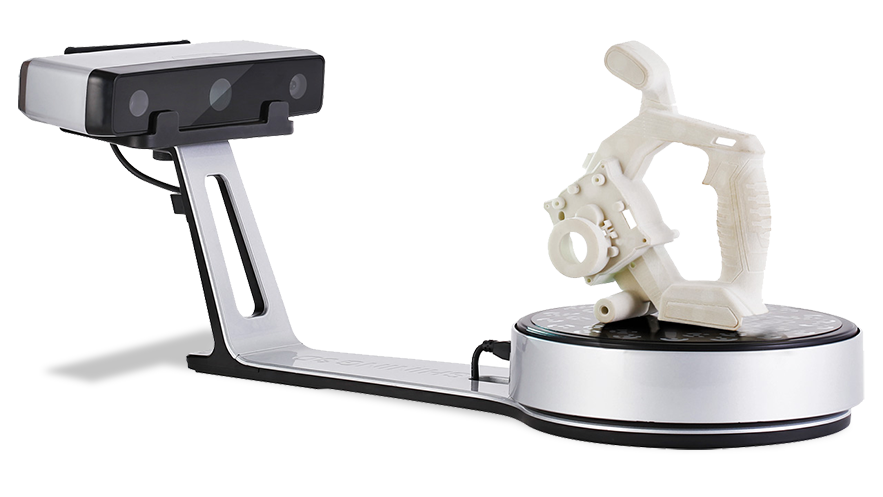We have much experience with hardware prototyping of plastic parts, metal parts and electronic parts. Electro-mechanical prototypes typically require software prototyping, which we also have much experience with.
We are confident we can deliver rapid prototyping solutions for you. The following sections outline some key phases.
Our core business is focused on projects that have a break-even point, such as resale via mass production. To learn more about this see our page on Melba New Product Development.
Product Design Phase (Computer modeling from scratch or 3D scanning)
During this phase we assess your requirements to determine if we are best to design your model from scratch using 3D CAD tools, 3D animations tools, or perform a 3D scan an mock up model.
While 3D scanning sounds like an easy option, it is not perfect, and requires much cleaning up of the model. Further it produces a file with point cloud data, which then must be converted to a typical CAD file (e.g. .igs, .stp, and/or .stl). It is because of these reasons, it is generally quicker to create the design from scratch (unless the target requirement is just to reprint the scanned object without any additional design features - which is a service we're not keen on providing).
In terms of electronics - generally we design custom electronics to get the unit cost down, but in some cases we might use off-the-shelve electronics (e.g. Proof-of-concept prototype).

Product Prototyping Phase
Plastic mechanical parts will likely be 3D printed via various methods such as Fused Deposition Modeling (FDM), Stereolithography (SLA), Selective Laser Sintering (SLS), Multi Jet Fusion (MJF) or CNC'ed in some cases. The material options are kinda endless from rigid to rubbers, such as ABS, PLA, Polycarbonate (PC), Acrylic (PMMA), PET, PEEK, Polyamide aka Nylon (PA), Glass reinforced nylon (PA66+GF), Polyurethane (PU), Polypropylene (PP), Polyvinyl Chloride (PCV), Thermoplastic Elastomer (TPE), Thermoplastic Olefin (TPO), Thermoplastic Polyurethane (TPU), PEBA 2301, Nitrile Rubber (NBR), Polytetrafluoroethylene aka Teflon (PTFE) and more. There are also various finish options such as transparent, transulent, colours, electro-plating, reflective mirror, and screen-printing graphics.
Metal mechanical parts can be 3D printed also, however in our opinion CNC is still the better option. The material options are also kinda endless such as aluminum (AL), steel, stainless steel (SS), brass, etc. There are also various finish options such as blackening, electro-plating (Chrome-plating, Nickel-chrome plating, Zinc-plating, Galvanizing), anodized (black, matte clear), and chromating conversion.
We've also made prototypes using materials such as Carbon Fiber, Fibreglass, Glass wool, DuPont, Vectran, conductive thread, and look forward to playing with Graphene one day.
Electronic parts will involve manufacturing of bare PCBs, then assembling PCB surface-mount (SMT) and through-hole (THT) components via soldering methods such as a stencils, reflow oven, IR heat lamp, hotair rework station, soldering iron, etc.
Hardware bugs are likely, and we'd hack things to make the working prototype. During this process we'll make notes on the design changes required for the next revision.

Your Partner in Innovation: COLETEK Serving Businesses Across Melba, Australian Capital Territory and Beyond
Let’s build something remarkable together.
Contact UsRapid 3D Prototyping for Melba – Our Clients: Big Brands & Small Businesses


















































































































































Rapid 3D Prototyping for Melba – Amazing Customer Testimonials
I highly recommend to anyone with a need for data recovery to contact COLETEK - they are impressive from start to finish. I was impressed with the turnaround of each stage of the job, as well as with the cost to complete it. These guys are excellent to deal with, great communicators and clearly know their stuff... and, as I understand, HDD data recovery is only one component of the work that COLETEK does. Well done guys, keep up the great work!

Delivered excellence on time, great work and great team, thanks!

Delivered excellence on time, great work and great team, thanks!

Skykraft is a Canberra based company designing and developing spacecraft for the delivery of global space-based services. Luke and the team have been very responsive with quotes and delivery of machined parts for our company. Looking forward to working with COLETEK on our space programmes.

I highly recommend to anyone with a need for data recovery to contact COLETEK - they are impressive from start to finish. I was impressed with the turnaround of each stage of the job, as well as with the cost to complete it. These guys are excellent to deal with, great communicators and clearly know their stuff... and, as I understand, HDD data recovery is only one component of the work that COLETEK does. Well done guys, keep up the great work!

We've worked with Luke and the team on and off for the past two years. We've found them very accessible and extremely thorough in their dealings. Their documentation is second to none and we’d have no hesitation recommending them on this basis alone.
COLETEK have been absolutely fantastic in their support and manufacture of various components for us. Our designs are always bespoke, intricate and low volume and it’s great to have an Australian company like COLETEK as a trusted and quality manufacturer for our spacecraft mechanical components and assemblies – which have been flight proven through successful mission operations. Keep up the great work!
Skykraft is a Canberra based company designing and developing spacecraft for the delivery of global space-based services. Luke and the team have been very responsive with quotes and delivery of machined parts for our company. Looking forward to working with COLETEK on our space programmes.

We had the opportunity to work with Coletek on the re-work of some complex SMD PCB assemblies during 2019. The work was carried out to a very high standard and we were extremely pleased with the outcome. We would not hesitate to recommend COLETEK for any type of complex technology work requiring high accuracy and professionalism.

We had the opportunity to work with Coletek on the re-work of some complex SMD PCB assemblies during 2019. The work was carried out to a very high standard and we were extremely pleased with the outcome. We would not hesitate to recommend COLETEK for any type of complex technology work requiring high accuracy and professionalism.

COLETEK have been absolutely fantastic in their support and manufacture of various components for us. Our designs are always bespoke, intricate and low volume and it’s great to have an Australian company like COLETEK as a trusted and quality manufacturer for our spacecraft mechanical components and assemblies – which have been flight proven through successful mission operations. Keep up the great work!
We've worked with Luke and the team on and off for the past two years. We've found them very accessible and extremely thorough in their dealings. Their documentation is second to none and we’d have no hesitation recommending them on this basis alone.

